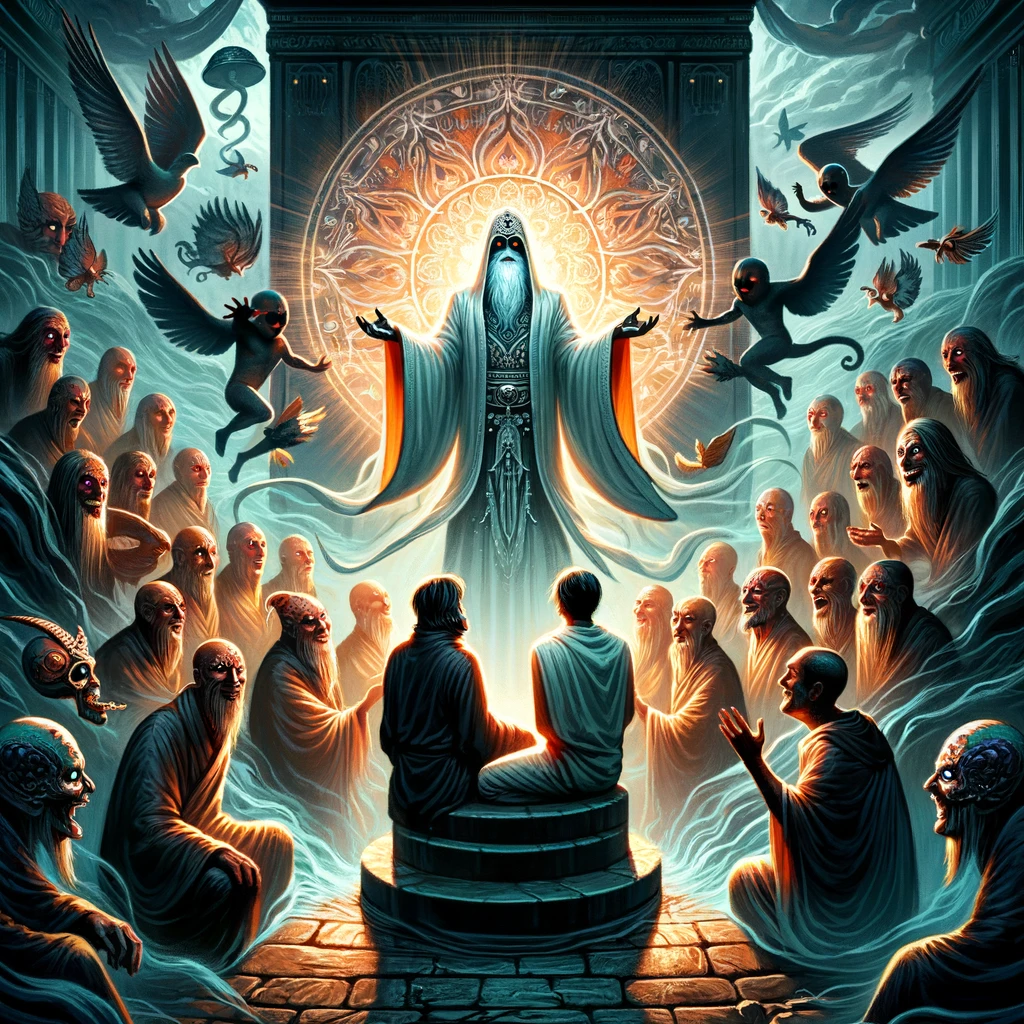The power of charisma has always fascinated me. Maybe it's because I've seen firsthand how a magnetic personality can light up a room, or perhaps it's because I've watched in horror as that same charm led people down a path of destruction. Either way, I've made it my mission to understand this force and explore its potential for good and evil. And let me tell you, it's been one hell of a ride.
You see, charismatic people have a way of getting under your skin. They know just what to say, how to say it, and when to flash that winning smile. Before you know it, you're eating out of the palm of their hand, ready to follow them into battle or off a cliff. Trust me, I've been there. I once followed a charismatic leader so blindly that I didn't realize I was in a cult until I was wearing robes and chanting in a foreign language. Technically, they just convinced me to join Amway, but they are very similar.
But I'm getting ahead of myself. Let's start with the basics. What is it about charismatic people that's so damn irresistible?
Well, for starters, they're master communicators. They could sell matches to Smokey the Bear and make him feel good about it.
They paint pictures with their words, making you feel you're part of something substantial, something special. It's like they've got a direct line to your hopes and dreams, and they know just how to press those buttons.
But it's not just about the words. Charismatic people have a presence, an energy that draws you in. They carry themselves with a confidence that borders on arrogance, but somehow, it's endearing. They make you feel like they've got everything under control, even as the flames rise high around them. And when they turn that charm on you and make you feel you're the only person in the world who matters, well, it's game over. You're putty in their hands.
Now, I know what you're thinking. "But isn't charisma a good thing? Don't we want leaders who can inspire and motivate us?" And you're right, to a point. When used for good, charisma can be a powerful tool. It can rally people around a cause, inspire them to be their best selves, and drive positive change. I've seen it happen. I've watched charismatic leaders build movements that changed the world for the better.
But here's the thing: Charisma is like a weapon. In the right hands, it can protect and serve. But in the wrong hands, it can cause untold damage. Unfortunately, plenty of people are all too happy to use their charisma for personal gain, no matter who gets hurt.
I learned this lesson the hard way when I lost my relationship with my friend to a charismatic leader who radicalized him with dangerous ideas. This leader made my friend feel part of something special as if he had been chosen for a higher purpose. He promised him a sense of belonging, a chance to make a difference in the world, and my friend bought into it completely.
At first, I didn't think much of it. My friend had always been passionate about politics, and I figured this was just another phase. But as time went on, I watched him change. He started spouting hateful rhetoric, cutting off friends and family who disagreed with him. He became obsessed with this leader, hanging on his every word, even when those words started to sound not just crazy but dangerous.
I tried to reason with him, to point out the flaws in this leader's arguments. But it was like talking to a brick wall. My friend was so thoroughly indoctrinated that he couldn't see the truth. He'd given up everything to follow this man - his critical thinking, his relationships, his very sense of self.
Watching someone I loved being manipulated like that was a painful realization. And the worst part was that I felt helpless to stop it. This leader had his hooks in deep, and he wasn't letting go.
In the end, my friend cut ties with all of us. He said we were holding him back and couldn't see the truth like he could. It broke my heart, but it also opened my eyes. I realized how easily charisma could be weaponized and how it could be used to lead people down a dark path.
It was a hard lesson, but it taught me to be wary of leaders who demand unquestioning loyalty and discourage questioning and dissent. If someone tells you to stop thinking for yourself and to trust them unequivocally, that's a huge red flag. No true leader should want mindless followers.
And that's the heart of the matter. As alluring as charisma can be, we can't let it short-circuit our bullshit detectors. We must question, challenge, and hold our leaders accountable, no matter how much we may like them because a leader's actions speak louder than their words. If they're not walking the walk, all the charm in the world won't make up for it.

I've seen charismatic leaders in all walks of life, from business to politics to religion. While the specifics may vary, the dangers are the same. In business, a charismatic CEO can charm investors and drive up stock prices, even as the company is crumbling. I once watched a CEO give a speech that was so inspiring that I almost forgot that his company was being investigated for fraud. Talk about a reality distortion field!
In politics, the stakes are even higher. A charismatic leader can sway an entire nation, especially in times of crisis. They can make people believe they alone can solve all their problems and are the saviour they've been waiting for. It's a seductive message, especially when you're scared and hurting. But all too often, those promises turn out to be empty. The saviour becomes a tyrant; by then, it's too late.
And don't even get me started on charismatic religious leaders. I've seen people give up everything, their money, their families, their very sense of self, all because some smooth-talking guru promised them enlightenment. It's heartbreaking to watch and even harder to break free from.
So, what can we do? How can we protect ourselves from the siren song of charisma? Well, the first step is to know ourselves. We all need to belong, to feel special and valued. Charismatic leaders exploit that need. If we're aware of our vulnerabilities, we can be more discerning about who we follow.
We also need to cultivate a healthy skepticism. If something sounds too good to be true, it probably is. If a leader makes grand promises or claims to have all the answers, red flags should go up. No one person has a monopoly on truth, no matter how convincing they may be.
It's also important to surround ourselves with diverse perspectives. If we only listen to people who think like us, we're susceptible to groupthink and manipulation. We must seek dissenting voices and engage in honest debate and discussion. It may be uncomfortable sometimes, but it's essential for maintaining a grip on reality.
And perhaps most importantly, we need to hold our leaders accountable. Charisma should not be a free pass for inappropriate behaviour. If leaders act unethically or abuse their power, we must speak up, even if it means going against the crowd. It's difficult, but it's necessary.
Charisma is a double-edged sword. It can inspire and uplift or manipulate and control. The key is discernment, in learning to separate the substance from the flash. I've honed this skill over the years, often through painful experiences, but it's more important now than ever.
Because let's face it, we live in a world that's all too easily swayed by a pretty face and a silver tongue. We're bombarded with charismatic figures vying for our attention and allegiance. And in times of uncertainty and fear, it's all too tempting to follow anyone who promises us safety and certainty, no matter the cost.
But we owe it to ourselves and to each other to be smarter than that, to use our heads and our hearts, to recognize charisma for what it is: a tool that can be used for good or ill, and to make sure that we're following leaders who are worthy of our trust and our loyalty.
So, the next time you find yourself drawn to a charismatic leader, take a step back. Ask yourself the hard questions. Look beyond the charm and the hype and see the person for who they really are. It's not always easy, but it's always necessary.
In the end, the true test of a leader is not how they make us feel but what they inspire us to do. And if we want to build a just, compassionate, and free world, we need leaders who aren't just charismatic but truly worthy of our trust and support.
So, here's to discernment, critical thinking, and the courage to stand up for what's right, even in the face of the most alluring charm. It's a tall order, I know. But we can navigate this treacherous terrain if we work at it and support each other. We can learn to enjoy the warmth of charisma without getting burned by its flames. And maybe, just maybe, we can harness its power for the greater good.
After all, I'm still a believer in the potential of charisma. I've seen it work wonders when wielded with wisdom and integrity. But I'm also a realist. I know the dark side all too well. And I'm also determined to help others see it, one cautionary tale at a time.
So, consider this your warning and your invitation. A warning to tread carefully in the face of charisma, question boldly, and think critically. And an invitation to join me on this journey of understanding, to explore the shadows and the light of this most potent of human qualities.
Together, we can learn to navigate the siren song of charisma. We can learn to use its power for good while guarding against its pitfalls. It won't be easy, but nothing worth doing ever is.
And who knows? Maybe one day, we'll be the charismatic leaders, using our gifts to build a better world. But if we do, let's make a pact: to always use our powers for good, always welcome dissent, and to always, always put truth and integrity first.
Because that's what real leadership is all about—not just charm but character, not just words but deeds, and not just the ability to inspire but also the wisdom to know what's right and the courage to do it.
So, here's to the journey, my friends. May we navigate it with discernment, humour, and with hope. And may we always remember: Charisma may dazzle, but our choices define us.


